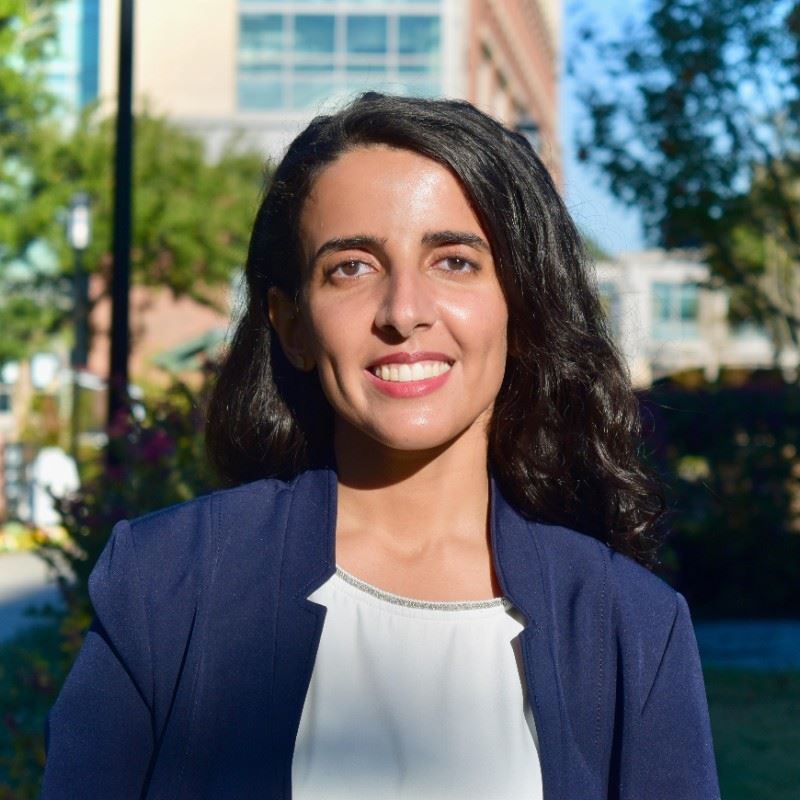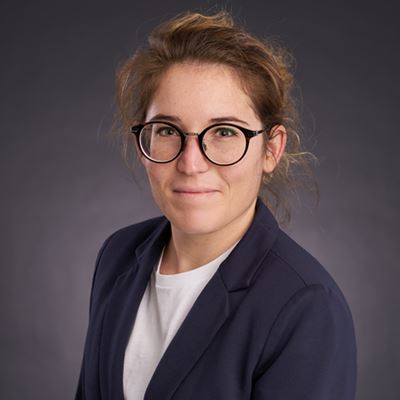Previous Member Spotlight
April Member Spotlight - Dr Hana Al Alshaykh
 Dr. Hana Al Alshaykh is a Clinical Pharmacogenomics Specialist and a Board-Certified Pharmacotherapy Specialist. She completed her Doctor of Pharmacy degree at Medical University of South Carolina (MUSC) and her postgraduate year residency (PGY1) training at King Faisal Specialist Hospital and Research Centre (KFSHRC). She continued her career path through a Clinical Pharmacogenomics (PGx) PGY2 training at University of Florida. Her training and expertise concentrate on the implementation of Pharmacogenomics service in clinical practice and developing it from ground level up. Currently she works at KFSHRC as PGx implementer in collaboration with Pharmaceutical Care Division and Center for Genomics Medicine and she couples her interest with research and teaching as she loves to see precision medicine disseminates and grow in the Middle East region.
Dr. Hana Al Alshaykh is a Clinical Pharmacogenomics Specialist and a Board-Certified Pharmacotherapy Specialist. She completed her Doctor of Pharmacy degree at Medical University of South Carolina (MUSC) and her postgraduate year residency (PGY1) training at King Faisal Specialist Hospital and Research Centre (KFSHRC). She continued her career path through a Clinical Pharmacogenomics (PGx) PGY2 training at University of Florida. Her training and expertise concentrate on the implementation of Pharmacogenomics service in clinical practice and developing it from ground level up. Currently she works at KFSHRC as PGx implementer in collaboration with Pharmaceutical Care Division and Center for Genomics Medicine and she couples her interest with research and teaching as she loves to see precision medicine disseminates and grow in the Middle East region.Questions:
1. How long have you been a member of PGRN, and how did you first join PGRN?I’ve been a member of PGRN for 2 years, yay! I joined while I was doing my Clinical Pharmacogenomics PGY2 residency training at University of Florida.
2. What is your current position/role, and what do you enjoy most about it?
I’m a Clinical Pharmacogenomics Specialist at King Faisal Specialist Hospital and Research Center and an Adjunct Assistant Professor at Alfaisal University, Riyadh, Saudi Arabia.
I work with an interdisciplinary team to build the infrastructure of pharmacogenomics clinical service from ground level up, providing clinical pharmacogenomics consults, and maintaining/updating the scope and content of the service for optimal utilization over time.
What I enjoy the most is the dynamic nature of my job; as my responsibilities are varying across different stages of the implementation. It integrates multiple tasks and skills while going through the process. It always excites me to learn, teach, and conduct research all while building the service and expanding it to reach more patients. Also, it is wonderful to be part of the implementing team leading an innovative service to optimize patient care across different disciplines.
3. How has PGRN helped your career in pharmacogenomics?
Being part of PGRN is a fantastic way to connect with pharmacogenomics experts and stay close by collaborative and research efforts. Moreover, seeing the progress of my collogues in advocating for pharmacogenomics service and expanding its access genuinely delights and motivates me.
4. What do you see as the most exciting advances in pharmacogenomics over the next 2-5 years?
Getting a closer attention and support from drug-regulating and medical agencies. This will help big time in the widespread adoption of pharmacogenomics testing within resources that healthcare providers are more familiar with such as drug labeling and disease management guidelines. The competition among the providers of pharmacogenomics testing along with advancing pharmacogenomics testing itself will promote for a more accessible and affordable pharmacogenomics testing.
Personal questions
5. If there are no restrictions to travel, where would you like to go in the next 3-6 months?
Hop on a sailing boat and explore the far east and pacific islands!
6. When you’re not working, how do you enjoy spending your time?
Go to the nearest water access for freediving or kitesurfing J
March Member Spotlight - Amy Bower
 How long have you been a member of PGRN, and how did you first join PGRN?
How long have you been a member of PGRN, and how did you first join PGRN?
2005. I was leading the development of a molecular device to detect variants in the UGT1A1 gene in individuals receiving Irinotecan for colon cancer. I was also part of the International Haplotype Map Project and interested in variants in genes involved in drug response. I utilized the PharmGKB in my work and attended a meeting in Hawaii.
What is your current position/role, and what do you enjoy most about it?
For the past 15 years I have led a research program funded by NICHD at the ACMG focused on accelerating the discovery of novel technologies for screening, diagnosis, treatment, and management of disease in newborns and children. That effort is ending this year but it has been especially rewarding since I have a son with a condition that is now part of newborn screening around the world, Severe Combined Immunodeficiency.
How has PGRN helped your career in pharmacogenomics?
For almost twenty years, PGRN has provided amazing case studies for the application of genetics and genomics to improve outcomes in individuals across the lifespan. I think that pharmacogenomics has always been the most practical and useful application of genomics to individualize treatment and management of disease. For my next chapter, I am especially interested in adding pharmacogenomic variants to newborns and age-based screening panels to help inform parents and families.
What do you see as the most exciting advances in pharmacogenomics over the next 2-5 years?
The continued awareness of the importance of pharmacogenomics to optimize the use of lifesaving therapies. I think that it will be especially important in combination with gene and molecular therapies as we learn more about the outcomes after presymptomatic treatment of genetic disease.
Personal questionsIf there are no restrictions to travel, where would you like to go in the next 3-6 months?
Ireland
When you’re not working, how do you enjoy spending your time?
Gardening and spending time with my twins.
March Trainee Member Spotlight - Maud Maillard
 How long have you been a member of PGRN, and how did you first join PGRN?
How long have you been a member of PGRN, and how did you first join PGRN?
I have been a member of PGRN for two years, now. I joined the network when I started my postdoc at St. Jude.
What is your current position/role, and what do you enjoy most about it?
I am a PharmD, PhD, currently working as a postdoctoral associate in Dr. Jun J. Yang’s lab at St. Jude Children’s Research Hospital.
I have always known I wanted to be a researcher, and I got interested in pharmacogenomics during my PhD. Thus, I could not have dreamt of a better place than St. Jude and especially Dr. Yang’s lab to pursue my early academic career in the field of pharmacogenomics of acute lymphoblastic leukemia. In only two years, I significantly developed my scientific skills, built strong connections with colleagues worldwide and I have learned a lot about myself, thanks to this always positive and very dynamic environment. What I enjoy most is that we never get bored of (re)searching!
How has PGRN helped your career in pharmacogenomics?
As a foreigner, PGRN has significantly helped me to expand my network overseas. The PGRN annual meeting is a key for young researchers who want to connect with significant people in the field.
What do you see as the most exciting advances in pharmacogenomics over the next 2-5 years?
I wish we could implement more pharmacogenes and convince more people about the importance of pharmacogenomics in all therapeutic areas. I am really excited about the future large-scale studies involving databases like AllOfUs and the fact that we will include more individuals from different ancestries in the cohorts for genetic association studies.
Personal questions
If there are no restrictions to travel, where would you like to go in the next 3-6 months?
I plan to explore the Northwest part of the country, go hiking in Yellowstone, and drive all the way up to Glacier National Park.
When you’re not working, how do you enjoy spending your time?
I really enjoy running and hiking!
February Member Spotlight - Oyinade Kehinde

1. How long have you been a member of PGRN, and how did you first join PGRN?
I joined PGRN on July 20, 2020. My joining was in a quest to satisfy my lack of knowledge in the field of pharmacogenomics due to my relentless pursuit in optimizing patient care within my institution, Federal Neuro-Psychiatric Hospital, Lagos, Nigeria.
2. What is your current position/role, and what do you enjoy most about it?
As a clinical pharmacist, I encountered a persistent challenge; the variable response to psychotropic medications among patients, coupled with the occurrence of adverse drug reactions. Witnessing the financial strain and emotional toll this took on patients and their caregivers, along with the frustration among psychiatrists grappling with treatment decisions, stirred a passion within me to seek solutions.
As I wanted to learn more and make a difference, I jumped into precision medicine and pharmacogenetics. Even though my country didn't have much training or support, I didn't let that stop me. I believed in immersing myself in the global community of experts, which led me to become a member of PGRN from a developing country.
3. How has PGRN helped your career in pharmacogenomics?
This affiliation has not only provided me with access to cutting-edge research and resources but also connected me with mentors whose guidance proved invaluable in navigating the complexities of pharmacogenetics. One such mentorship opportunity arose when I reached out to Akinyemi Oni-Orisan and Laura Ramsey. Their willingness to share their expertise and offer collaborative opportunities propelled my journey forward, reinforcing my belief in the power of mentorship and collaboration in driving innovation.
With the support of PGRN, I'm ready to address the issues in psychiatric treatment in my country and globally. My strong dedication to improving patient care with precision medicine keeps me motivated to push limits, explore new methods, and promote the use of pharmacogenetics.
4. What do you see as the most exciting advances in pharmacogenomics over the next 2-5 years?
I'm excited about a big change in clinical pharmacogenetic testing becoming widely used in various medical specialties globally. I think this change will happen because clear, consistent, and comprehensive practice guidelines will be created. These guidelines will address more inclusion of under-represented populations with diverse genetic make-up, making sure everyone has fair access to these tests.
Global collaboration among researchers, clinicians, policymakers, and stakeholders is crucial for improving pharmacogenetic practices. By working together, we can bridge gaps, create a unified approach to gene-based therapies, and enhance healthcare. This effort aims to bring innovation, accessibility, and inclusivity, ushering in a new era of healthcare excellence where everyone gets personalized treatments based on their genetic makeup and medical needs.
5. If there are no restrictions to travel, where would you like to go in the next 3-6 months?
I would pick the Maldives. The idea of being on these private islands with powdery white sand and distinct white beaches is an exciting prospect. Staying in one of those fancy overwater bungalows, stepping right into the clear lagoon – it would be a dream come true for me.
6. What’s something about you (a fun fact) not many people know?
My participation in the Calypso dance club in elementary school. It all began with a spontaneous decision to try something new, from learning the lively steps of traditional Caribbean dances to performing in front of a cheering audience during school events, every moment spent in the Calypso dance club was filled with excitement and a sense of accomplishment.
February Trainee Spotlight - Vincent Nyangwara

I have been a member of PGRN for 3 years. I joined the network through my current PhD supervisor, Prof. Collen, who serves as chair of the PGRN developing country committee.
2. What is your current position/role, and what do you enjoy most about it?
I am early career counselor in PGRN and a PhD student in Human genetics at the university of Witwatersrand in South Africa. First, I enjoy sitting in the PGRN board meetings and making a crucial decision on behalf of young folks around the globe. Secondly, I enjoy using an individual’s genomic make up to prescribed a medication, reducing drug sides effects like cardiotoxicity.
3. How has PGRN helped your career in pharmacogenomics?
I have interacted with many peers and mentors in PGRN of whom now I look up to in my career growth as a Pharmacogeneticist.
4. What do you see as the most exciting advances in pharmacogenomics over the next 2-5 years?
In the next 2-5 years, I foresee discovery of new associations between genetic variations and drug responses which may lead to a more comprehensive understanding of pharmacogenomic influences on drug response. Moreover, continued improvements in the efficiency, accuracy, and cost-effectiveness of genetic testing technologies, will make them more accessible for broader populations.
Personal questions
5. If there are no restrictions to travel, where would you like to go in the next 3-6 months?
To be honest, I like travelling around the world. With no restrictions, I see myself somewhere in the cold winter of Canada or Caribbean Island, spending time with my fiancée.
6. When you’re not working, how do you enjoy spending your time?
Work is important, but family is the reason we go to work. So when not at work, I spend most of my time with my fiancée. Taking her out for a walk or dinner are some of my favorite moments.

